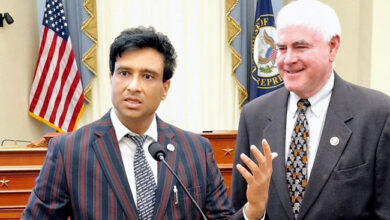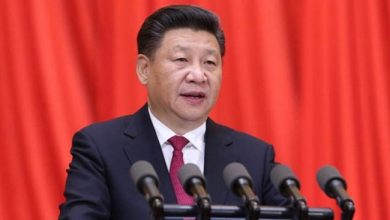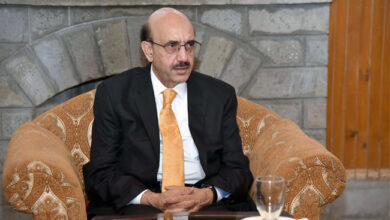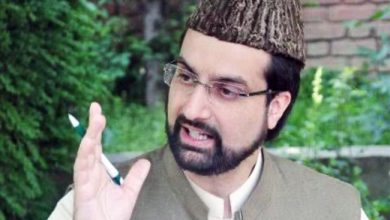Human Rights Council holds an interactive dialogue on the situation of human rights in Sri Lanka
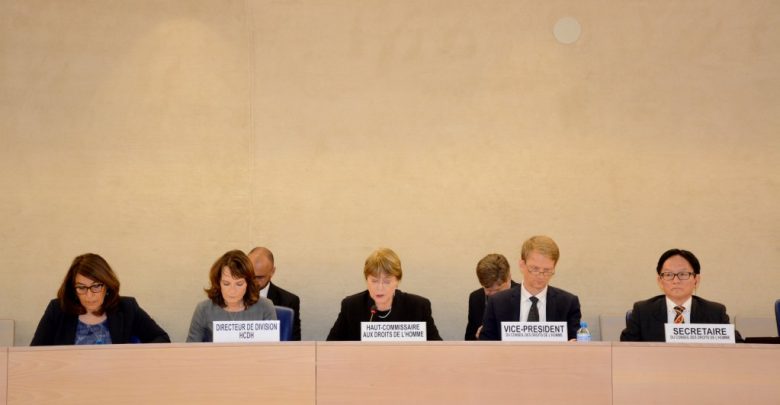
GENEVA (20 March 2019) – The Human Rights Council this morning held an interactive dialogue on the situation of human rights in Sri Lanka. It also concluded an interactive dialogue on the situation of human rights in Ukraine.

Michelle Bachelet, United Nations High Commissioner for Human Rights, presenting her report, acknowledged the open dialogue and sustained cooperation of the Government of Sri Lanka with her Office and welcomed the operationalization of the Office of Missing Persons, following initial delays. She also commended the establishment of the Office for Reparations, and looked forward to the swift appointment of its commissioners. Regarding the land occupied by the military in the northern and eastern provinces, some progress had been noted and further steps should be taken to complete that crucial process. However, the implementation of resolution 30/1 needed to be more consistent, comprehensive and accelerated. Continuing impunity risked fuelling communal and inter-ethnic violence and instability.
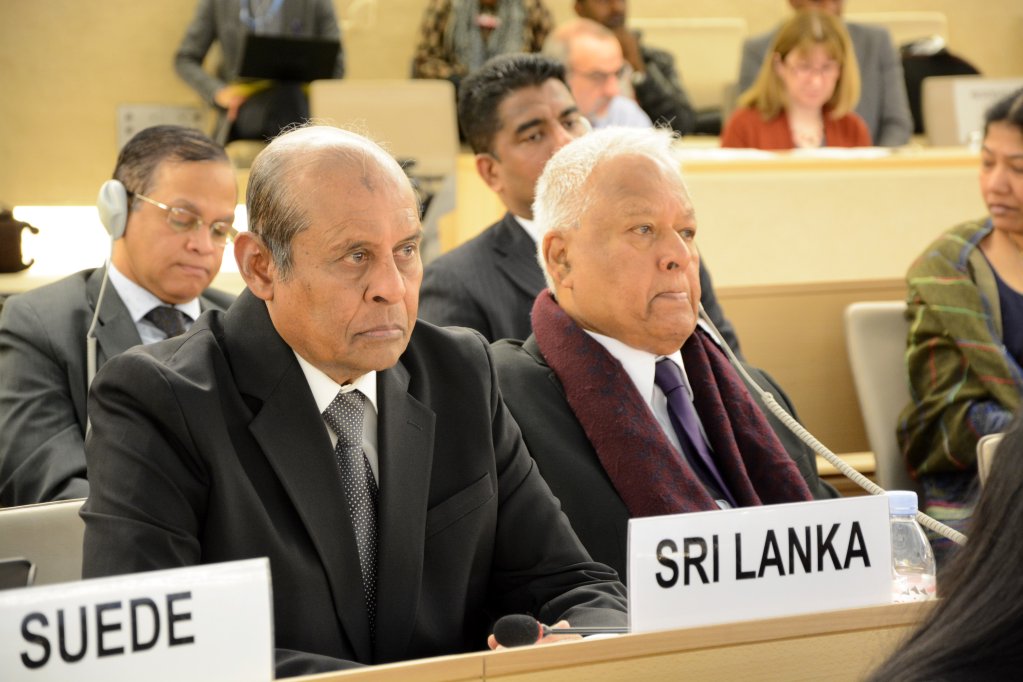
Speaking as the concerned country, Tilak Marapana, Minister of Foreign Affairs of Sri Lanka, said that the Office on Missing Persons was being fully operationalized to improve truth seeking. The replacement of the Prevention of Terrorism Act with the new counter terrorism legislation would ensure conformity with international standards. The Office of Reparations was established and Rs 500 million was allocated to pay monthly allowances to the families of disappeared persons who had a certificate of absence. Over 88 per cent of State land and 92 per cent of private lands had been released by security forces, not 75 per cent as contained in the report. Sri Lanka should be encouraged and assisted in finding innovative and viable local mechanisms to incorporate best practices.
In the ensuing discussion, speakers commended the Government for its ongoing constructive engagement with the Office of the High Commissioner but regretted the further delay to the implementation of the Council’s recommendations. The Government was urged to institute a durable reconciliation process, complete the return of occupied land, and advance transitional justice. A few delegations were concerned over proposals for a counter terrorism law that included the possibility of the death penalty as a punishment and called on Sri Lanka to uphold the moratorium on such punishments. Concern was also raised over aggravation of intercommunal tensions and discrimination against Christian, Muslim and Hindu minorities.
Speaking were European Union, Pakistan, Denmark, India, United Kingdom, Belgium, North Macedonia, Germany, Switzerland, Iceland, Norway, Ireland, China, Montenegro, Canada, Croatia, Austria, Liechtenstein and Australia.
Also taking the floor were the following non-governmental organizations: International Movement against all Forms of Discrimination and Racism (IMADR), Association Bharathi Centre Culturel Franco-Tamoul, World Evangelical Alliance, in a joint statement with Christian Solidarity Worldwide, Amnesty International, Human Rights Watch, Asian Forum for Human Rights and Development, Lawyers’ Rights Watch Canada, and International Commission of Jurists.
At the beginning of the meeting, the Council concluded its interactive dialogue on the situation of human rights in Ukraine. The presentation of the relevant reports on Ukraine by the Office of the High Commissioner for Human Rights, which took place on Tuesday, 19 March, can be read here.
Speaking as the concerned country, Ukraine noted that the Russian occupation had particularly affected the Crimean Tatars and Ukrainians. It was the duty, according to international humanitarian law, of the occupying power to make full reparations for the injuries caused and violations committed. Ukraine called on Member States and the Office of the High Commissioner for Human Rights to urge Russia to open the occupied territories in Crimea and Donbas for permanent monitoring. Ukraine invited all Special Procedures and international monitoring mechanisms to uphold the highest international standards of the promotion and protection of human rights, including during the upcoming election.
In the discussion, speakers deplored the serious effects of the conflict in the east of Ukraine on the civilian population, which suffered from grave human rights violations. They reiterated that any sustainable resolution of the conflict must be based on Ukraine’s sovereignty, independence and territorial integrity. They noted that all efforts should be made to improve the access of humanitarian assistance to eastern Ukraine, and that Russian convoys into Ukraine should be managed according to Ukraine’s legislation, international procedures, and respect Ukraine’s territorial integrity. Speakers were particularly concerned about the highly restricted exercise of fundamental freedoms, intimidation and harassment of human rights defenders, as well as forced conscription of Crimean residents. Some speakers regretted the lack of progress by Ukraine in the investigation of the crimes committed in Odessa in 2014 and the killings in Maidan, as well as the atrocious crimes committed by far-right groups.

Kate Gilmore, United Nations Deputy High Commissioner for Human Rights, in concluding remarks, confirmed that civilian casualties were decreasing; the current reporting period saw a 68 per cent decrease of casualties, with two civilian casualties in the reporting period, which was welcomed. A number of other measures were also welcomed, including legislative moves, laws regulating the movement of goods through the contact line, social reintegration of war veterans, and pensions reform. However, although hostilities had declined, suffering had not. Her report showed that 12 people had died navigating the crossing line, and general civilian suffering was high, as many had exhausted their savings in withstanding the conflict. Impunity was rife, and trials that took place were suspected not to be fair. The rise of right wing groups and their role in society could impact the credibility of the upcoming elections. Restrictions on freedom of movement, high unemployment, lack of public transport and a deterioration in civil life underscored daily life in Ukraine and the territories under discussion. There was no method of compensation in the case of destruction of civilian property or when property was requisitioned by the army.
Speaking were European Union, Estonia, Denmark, Lithuania, Germany, Croatia, Czech Republic, Finland, Latvia, Russian Federation, France, Switzerland, Iceland, Poland, Sweden, New Zealand, Bulgaria, Ireland, Montenegro, Georgia, Romania, Hungary, Canada, Turkey, Japan, Slovakia, Republic of Moldova, Norway, Portugal, United Kingdom, and Australia.

Also taking the floor were the following non-governmental organizations: Human Rights House Foundation, Minority Rights Group, Amnesty International, Russian Peace Foundation, World Federation of Ukrainian Women’s Organizations, and International Council of Russian Compatriots (ICRC).
The Council will next hold an interactive dialogue on the human rights situation in the Central African Republic, with special emphasis on civil society and the peace and reconciliation process.
Interactive Dialogue on Ukraine
Statement by the Concerned Country
Ukraine, speaking as the concerned country, said that the Russian occupation had particularly affected the Crimean Tatars who faced, for the second time in a century, a systematic effort to push them out of their homeland. Twenty-four Ukrainian sailors were brutally captured by Russia and their status as prisoners of war was confirmed by the Office of the High Commissioner for Human Rights. The story of the triumph of the “Russian World” which the Russian representatives persisted in telling was erected at the expense of Crimean Tatars and Ukrainians. Crimeans had seen a noticeable decline in their living standards. It was the duty of the occupying power, according to international humanitarian law, to make full reparation for injuries caused and violations committed. Two reports were prepared on the human rights situation in Crimea by the Human Rights Monitoring Mission but it was disappointing that the mission was not able to operate properly in the occupied areas of Donbas, where the rights to freedom of expression, assembly, religion and belief were regularly violated and remained unreported. Similar reports made on the situation in the Government-controlled territory were taken seriously and considered carefully by the Ukrainian authorities. Ukraine called on Member States and the Office of the High Commissioner for Human Rights to urge Russia to open the occupied territories in Crimea and Donbas for permanent monitoring. Ukraine invited all Special Procedures and international monitoring mechanisms to uphold the highest international standards to ensure the promotion and protection of human rights, including during the upcoming election. Ukraine was ready to listen to those genuinely interested in its democratic future and called on the Council to work with more tangible outcomes, but would not be lectured by cynical repeat offenders.
Interactive Dialogue on Ukraine
European Union remained deeply concerned about the human rights abuses in the illegally annexed Autonomous Republic of Crimea and the city of Sevastopol. The European Union called on Russia to immediately release all Ukrainian political prisoners, and asked all parties to implement their obligations under the Minsk Agreements. Estonia was concerned about the security situation in Donetsk and Luhansk, reiterating that Russia’s actions were in breach of the United Nations Charter as well as other bilateral commitments. Estonia reaffirmed its commitment to Ukraine’s sovereignty and territorial integrity within its internationally recognized borders. Denmark noted with satisfaction the decrease in conflict-related casualties in the region, but stressed the strain on more than 5 million people, including 1.3 million internally displaced persons. Reports of restrictions to the civil space in Ukraine, including of violence against journalists and activists, were concerning.
Lithuania was deeply concerned about the consistent denial to give the Office of the High Commissioner for Human Rights access to the areas of Donetsk and Luhansk, and the illegally annexed Crimea. Lithuania called for the immediate release of all Ukrainian citizens illegally detained by Russia, including the 24 seamen captured in the Kerch Straight. Germany was deeply worried at the breaches of the agreed ceasefire and the high level of civilian casualties in eastern Ukraine. Germany did not recognize the illegal Russian annexation of the Autonomous Republic of Crimea and Sevastopol, and asked how the international community could support civil society in Ukraine. Croatia regretted that access of the Monitoring Mission to temporarily occupied territories of Ukraine had been consistently restricted. Croatia was also troubled about the increasing number of internally displaced persons, amounting to 1.3 million people.
Czech Republic deplored the serious effects of the conflict in the east of Ukraine on civilians, who suffered from grave human rights violations. It reiterated that any sustainable resolution of the conflict must be based on Ukraine’s sovereignty, independence and territorial integrity. Finland noted that all efforts should be made to improve access of humanitarian assistance to eastern Ukraine. Russian convoys into Ukraine should be managed according to Ukraine’s legislation, international procedures, and with respect to Ukraine’s territorial integrity. Latvia remained greatly concerned about the human rights situation in armed group-controlled territory in eastern Ukraine and in the illegally annexed Crimea. It was particularly concerned about the highly restricted exercise of fundamental freedoms, intimidation and harassment of human rights defenders, as well as the forced conscription of Crimean residents.
Russian Federation took note with concern of a number of human right violations in Ukraine, including the lack of social security benefits and material compensation by the authorities in Kiev for civilians’ houses. It also regretted the lack of progress by Ukraine in the investigation of the crimes committed in Odessa in 2014 and the killings in Maidan, as well as the atrocious crimes committed by far-right groups. France expressed serious concern about the increasing number of human rights abuses committed in eastern Ukraine, as well as about the human rights violations in occupied Crimea and the persecution of Crimean Tatars. France called on all stakeholders to respect international humanitarian law, and to implement the relevant recommendations and the obligations under the Minsk Agreements. Switzerland called on all parties in Ukraine to respect international humanitarian law and to enhance the living conditions of the people affected by the conflict in Ukraine, as well as to lift barriers to the work of the Office of the High Commissioner for Human Rights. In what areas had progress been made in the past three months?
Iceland said that the conflict was hitting the civilian population hard economically and was stalling social development, and Iceland was particularly concerned about human rights violations carried out by the Russian de facto authorities in illegally annexed Crimea. Iceland underlined the importance of election monitoring by the Organization for Security and Cooperation in Europe to ensure democracy and the rule of law in the area. Poland noted that the largest number of human rights violations occurred in the self-proclaimed Luhansk and Donetsk People’s Republics and called on the de facto authorities to allow proper and unimpeded access to the mission to the whole territory of Ukraine within its internationally recognized borders and to respect both international humanitarian law and human rights law. Sweden said the rights of Crimean Tatars had been gravely affected as leaders and community members were persecuted, media outlets were closed, and their self-governing body was banned. It was disgraceful that the monitoring mission was still denied access and Sweden condemned Russia’s illegal annexation of Crimea.
New Zealand called for the full implementation of the Minsk Agreements. New Zealand remained concerned about the escalation of tensions in the Kersh Strait in November 2018 and urged Russia to show restraint and take steps to diffuse the tensions, including releasing the detained Ukrainian vessels and crew. Bulgaria was concerned about the shelling and destruction in eastern Ukraine and urged all sides to the conflict to observe the latest ceasefire agreement. Bulgaria asked what steps the United Nations human rights bodies and mechanisms could take to expedite the release of the 24 crew members of the three Ukrainian ships who were detained in the Russian Federation. Ireland said that the continued denial of regular access to the Crimean Peninsula undermined the protection of human rights. Ireland was concerned about the difficulties faced by those displaced by the conflict and asked for an assessment of the current situation of internally displaced people in Ukraine.
Montenegro called for full access to be granted to the Monitoring Mission. Montenegro regretted that it was the civilian population that continued to pay the highest price under the ongoing conflict on the territory of Ukraine. Georgia was deeply concerned about reports of torture and restrictions of free media and movement in occupied Crimea. Georgia reiterated the strong call on Russia to immediately release the seaman captured in the Kerch Strait, and to grant access to the Monitoring Mission to all territories. Romania remained deeply concerned about the continued violation of human rights in eastern Ukraine and the illegally annexed Autonomous Republic of Crimea and Sevastopol. Romania called for the release of all Ukrainian citizens illegally detained in Russia and the illegally annexed territories.
Hungary called on the Council to follow closely the legal acts to be taken by Ukraine with regard to the State’s Language Law and the Law on Education that jeopardized the human rights of minorities. Hungary criticized the lack of consultation with the representatives of the groups concerned. Canada remained concerned about the treatment of the Tatar population of Crimea, which was disproportionality affected by the conflict. They called for the unhindered access of the Monitoring Mission to all areas, including detention centres across the territories. Turkey fully supported the sovereignty of Ukraine over its territory and did not recognize the annexed territories. As a country hosting 3 million people of Crimean descent, Turkey continued to stand by the Crimean Tatars for their peaceful struggle for peace in their homeland.
Japan called upon all concerned parties to implement the Minsk Agreements in a way that fully respected Ukraine’s sovereignty and territorial integrity. Japan expected the immediate release of the Ukrainian crew members who had been detained in the incident near the Kerch Strait in November 2018. Slovakia remained concerned about the dynamics of the armed conflict in eastern Ukraine, and was worried about the lack of serious efforts by the parties to halt hostilities and restore peace. The ongoing human rights abuses in parts of eastern Ukraine and the dire social and economic situation was a matter of concern. Republic of Moldova said that it was reassuring to read about the significant decrease in the number of conflict-related civilian casualties. However, the international community should not lose sight of the suffering of the more than five million persons affected by the conflict in eastern Ukraine.
Norway called on de facto authorities in the self-proclaimed republics in Ukraine to release all arbitrarily detained persons, stop the practice of incommunicado detention, and allow access for international observers to all places of detention. Norway urged Russia to grant access to international observers in Crimea and to honour its obligations under international law. Portugal noted with concern the deterioration of the human rights situation in Crimea, as well as the situation of internally displaced persons along the contact line in eastern Ukraine. It called on all parties to the conflict to fully implement the ceasefire and disengagement provisions of the Minsk Agreements.
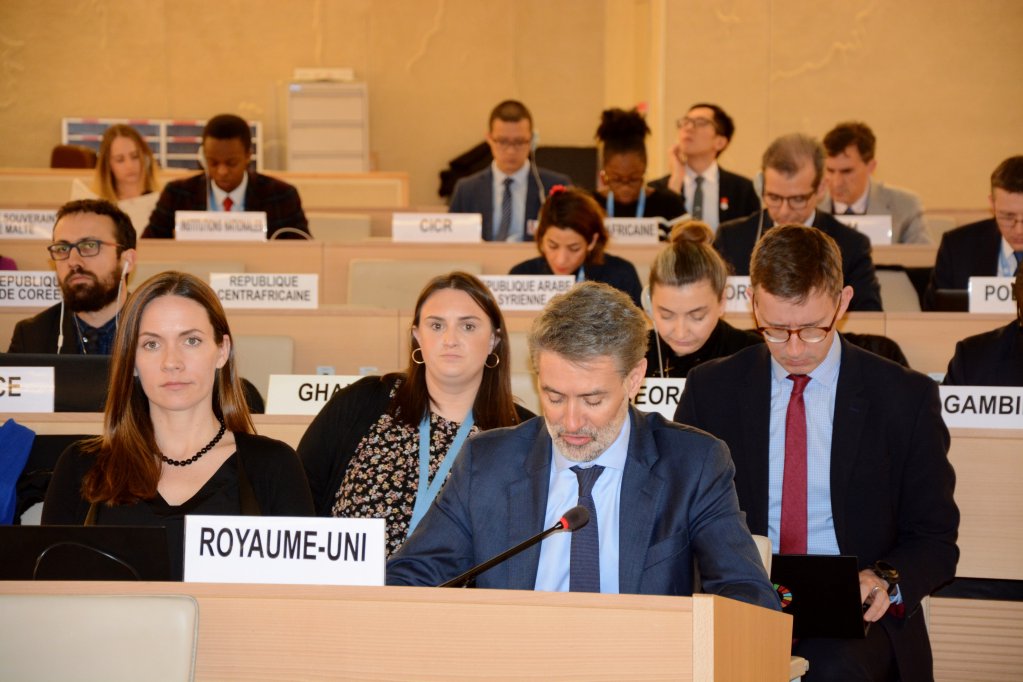
United Kingdom deplored Russia’s ban on international monitoring organizations to enter Crimea and called for access in line with the General Assembly resolution 73/263. The United Kingdom was troubled by reports of arbitrary arrests, incommunicado detentions, and torture of civilians in the non-Government controlled territories of Donetsk and Luhansk. Australia was particularly concerned about the reported attacks on vulnerable minorities and welcomed the High Commissioner’s views on options available to the international community to ensure that perpetrators were held accountable for human rights abuses in Ukraine. It called on Russia to use its influence to facilitate immediate and unimpeded access to Crimea and eastern Ukraine by reporting mechanisms.
Human Rights House Foundation asked what more could be done to facilitate access of international monitors to political prisoners in Russia and Crimea and to hostages in Donbas so as to assess the prison and detention facilities. Minority Rights Group highlighted the violations faced by the Roma communities in Ukraine who were targeted by far right groups and were living in vulnerable situations. The group provided recommendations on the successful implementation of the post 2020 Roma integration strategy.
Amnesty International was concerned about hate crimes in Ukraine targeting minorities and human rights defenders. It urged the Ukrainian authorities to ensure freedom of expression and media. Russian Peace Foundation was concerned about the lack of information contained in the report on linguistic violations perpetrated by Ukraine. Minority languages were being eradicated in schools and public space in a racist attempt by Kiev to assimilate minorities. World Federation of Ukrainian Women’s Organizations was concerned about the violation of the rights of women in the militarized zones. It called on the international community to continue monitoring the situation and not to forget the sources of the tensions, which were caused by a violation of international law. International Council of Russian Compatriots (ICRC) regretted that the report had seen a violation of international law as a result of the Kerch Strait incident. In effect, the Kerch Strait was recognized as internal waters of the Russian Federation, and it was an act of provocation by Ukrainian military vessels that had caused the escalation.
Concluding Remarks on Ukraine
KATE GILMORE, Deputy High Commissioner for Human Rights, in concluding remarks responded to questions from Switzerland, which had asked her to set out any improvements that had been witnessed in the Ukraine. She confirmed that civilian casualties were decreasing; the current reporting period saw a 68 per cent decrease of casualties, with two civilian casualties in the reporting period, which was welcomed. A number of other measures were also welcomed, including legislative moves, laws regulating the movement of goods through the contact line, social reintegration of war veterans, and pensions reform. However, although hostilities had declined, suffering had not. Her report showed that 12 people had died navigating the crossing line, and general civilian suffering was high, as many had exhausted their savings in withstanding the conflict. Impunity was rife, and trials that took place were suspected not to be fair. The rise of right wing groups and their role in society could impact the credibility of the upcoming elections. Restrictions on freedom of movement, high unemployment, lack of public transport and a deterioration in civil life underscored daily life in Ukraine and the territories under discussion. There was no method of compensation in the case of destruction of civilian property or when property was requisitioned by the army.
Ms. Gilmore said Ireland had asked about internally displaced persons. Those living along the contact line in eastern Ukraine continued to endure most of the suffering, with lack of access to health and social care. The Government continued to link pensions to internally displaced persons’ locations, despite consistent court decisions against such actions. Finland had asked what measures could be taken to ease the crossings at the contact line, and Ms. Gilmore said the conditions there were difficult, and it was essential that these daily connections between communities were maintained. They needed to be safe and quick for civilians, with access to medical aid made along this line. Her team were deeply concerned about the crackdown on civil society, and the systematic use by the Russian authorities of anti-extremist laws against civil society defenders in Ukraine. Freedom of religion was restricted, in particular for Muslim minority groups. Forced conscription was an ongoing concern, with the eighth round of conscription of Crimean citizens into the army underway. Since the conflict began, 14,800 Crimeans had been conscripted into the Russian army.
Bulgaria asked what measures could be taken to ensure the release of the seaman captured in the Kerch Strait, and the Deputy High Commissioner reaffirmed that according to international law, the final decision must be made by a competent tribunal. Poland, Lithuania and civil society groups asked what measures the international community could take to bring about an end to the conflict. She stated that a road map for the Government and all parties to immediately end hostilities was needed, and for implementation of the Minsk Agreements. Germany asked how the International community could support civil society ahead of the elections. Ms. Gilmore believed the international community could amplify calls for the governing parties and all stakeholders to refrain from using the legislative framework to attack civil society. In response to the United Kingdom’s question on how to ensure legal access to those subject to arbitrary action in disputed territories, she called for the international community to press for unimpeded access for the Monitoring Mission, and for all other aid groups operating in those territories.
Interactive Dialogue on Sri Lanka
Documentation
The Council has before it Promoting reconciliation, accountability and human rights in Sri Lanka – Report of the Office of the United Nations High Commissioner for Human Rights (A/HRC/40/23)
Presentation of Report of the Office of the High Commissioner for Human Rights on Promoting Reconciliation, Accountability and Human Rights in Sri Lanka
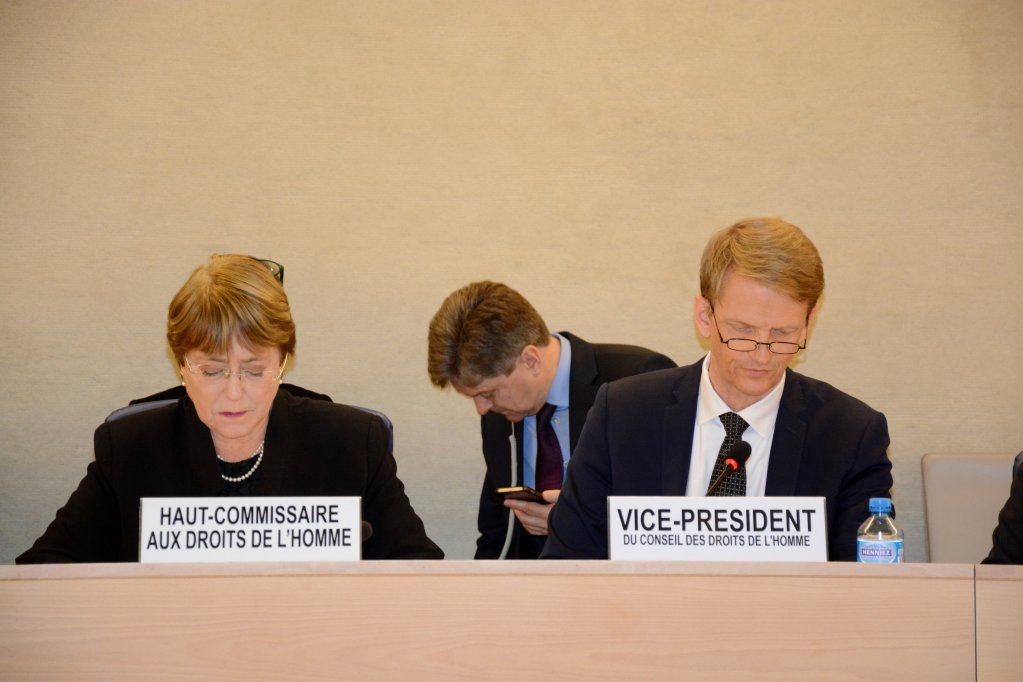
MICHELLE BACHELET, United Nations High Commissioner for Human Rights, acknowledged the open dialogue and sustained cooperation of the Government of Sri Lanka with her Office. Working closely with the United Nations Resident Coordinator and her Senior Human Rights Advisor, the Office had continued to provide technical support, including through the United Nations Peacebuilding Fund for Sri Lanka. The High Commissioner welcomed the operationalization of the Office of Missing Persons, following initial delays. The Office of Missing Persons planned to undertake the complex task of tracing the whereabouts of victims in a sensitive, thorough and objective manner, addressing the difficult situation of victims’ families. She also commended the establishment of the Office for Reparations, and looked forward to the swift appointment of its commissioners. The High Commissioner encouraged the Government to enable those two institutions to function effectively and independently, and to link them to a broader approach aimed at justice, real accountability and truth-seeking. Regarding the land occupied by the military in the northern and eastern provinces, some progress had been noted and further steps should be taken to complete that crucial process.
However, the implementation of resolution 30/1 needed to be more consistent, comprehensive and accelerated, Ms. Bachelet noted. A contributing factor to delays appeared to be a lack of common vision among the country’s highest leadership. Deadlock on those important issues was an additional and avoidable problem, with damaging impact currently on victims from all ethnic and religious groups and on society as a whole. The High Commissioner appreciated the complexity of transitional processes. The events leading to the declaration of a state of emergency in March 2018, and the constitutional crisis in October 2018, had created a political environment not conducive to the implementation of reform measures. The High Commissioner’s Office encouraged the Government of Sri Lanka to implement a detailed and comprehensive strategy for the transitional process with a fixed timeline. Legislation on the establishment of an independent Truth and Reconciliation Commission could be an important next step. Ms. Bachelet highlighted the importance of the security sector reform as part of a transitional justice process. Those reforms should include a vetting process to remove officers with questionable human rights record. There had been minimal progress on accountability, and lack of progress in setting up a special judicial mechanism to deal with the worst crimes committed during the 2009 conflict.
Continuing impunity risked fuelling communal and inter-ethnic violence and instability. Resolving those cases and bringing more perpetrators of past crimes to justice was necessary to restore the confidence of victims from all communities. The replacement of the Prevention of Terrorism Act had been on the Government’s agenda for four years. Ms. Bachelet encouraged the completion of that process, with measures to strengthen the draft law’s safeguards and oversight elements, and to tighten the definition of terrorist acts, which was currently too broad. She was also troubled about continuing allegations of torture and other human rights violations by security forces, including sexual violence. Effective, transparent and independent investigations by the Government would be positive. Another step in the right direction would be an end to the surveillance of human rights defenders, reprisals against them, as well as against victims. The High Commissioner highlighted the role of Sri Lanka’s independent commissions in entrenching the rule of law in the country. She emphasized that in co-sponsoring resolutions 30/1 and 34/1, the Government had recognized the need to address the past in order to build a future securely grounded in accountability, respect for human rights, and the rule of law.
Statement by the Concerned Country

TILAK MARAPANA, Minister of Foreign Affairs of Sri Lanka, speaking as the concerned country, said that the Office on Missing Persons was fully operationalized to improve truth seeking. The replacement of the Prevention of Terrorism Act with the new counter-terrorism legislation would ensure conformity with international standards. The Office of Reparations had been established and Rs 500 million was allocated to pay monthly allowances to the families of disappeared persons who had a certificate of absence. Over 88 per cent of State land and 92 per cent of private lands had been released by security forces, not 75 per cent as contained in the report. The test results on the skeletons found in the “mass graves” in Mannar confirmed that they dated back to 1499-1719 and were not current, the assumptions contained in the report that more mass graves may be found in the future would not be accepted. It was not possible to include non-citizens in its judicial processes, this precluded it from establishing a hybrid court. The actions of the security forces were against a designated terrorist organization and not against a community and there were no proven allegations against individuals on war crimes or crimes against humanity. Sri Lanka should be encouraged and assisted in finding innovative and viable local mechanisms to incorporate best practices.
Interactive Dialogue on Sri Lanka
European Union said that in 2015, by co-sponsoring the Council’s resolution 30/1, the Sri Lankan Government had recognized the need to address the past in order to build a better future. The Government was urged to institute a durable reconciliation process, complete the return of occupied land, and advance transitional justice.
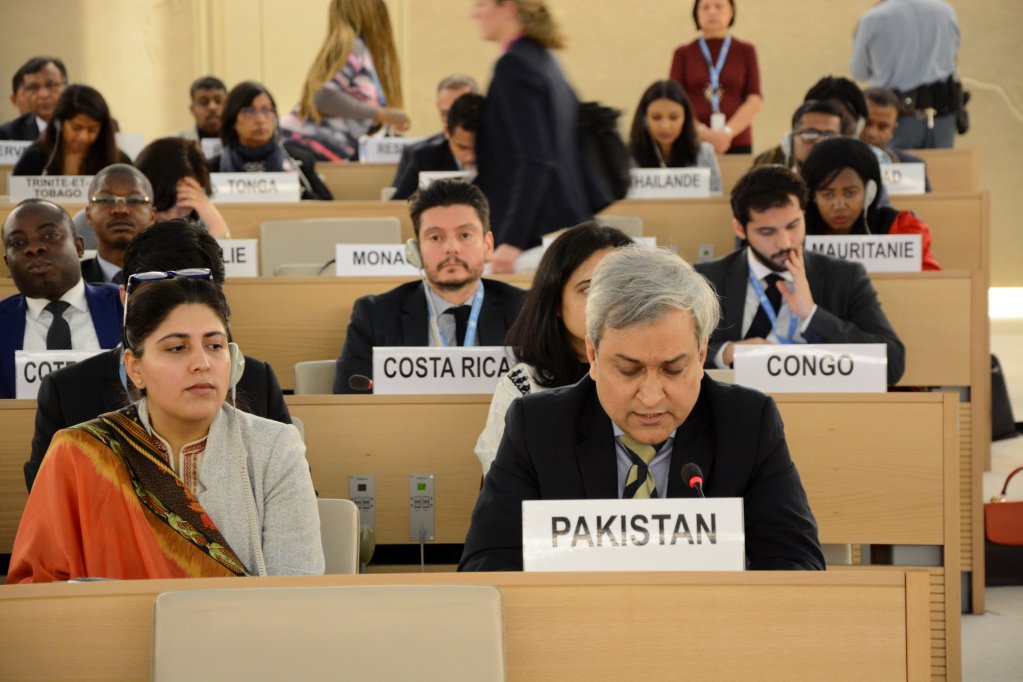
Pakistan welcomed the establishment of the Office of Missing Persons. The return of 92 per cent of private land was also welcomed and efforts in combatting cross-border terrorism were acknowledged. Denmark urged the Government to prepare a transparent strategy to prepare a transitional justice mechanism with a time bound plan and institutional reforms in the military and police. The High Commissioner was asked to elaborate how to strengthen support for victims of human rights violations, including women and children?
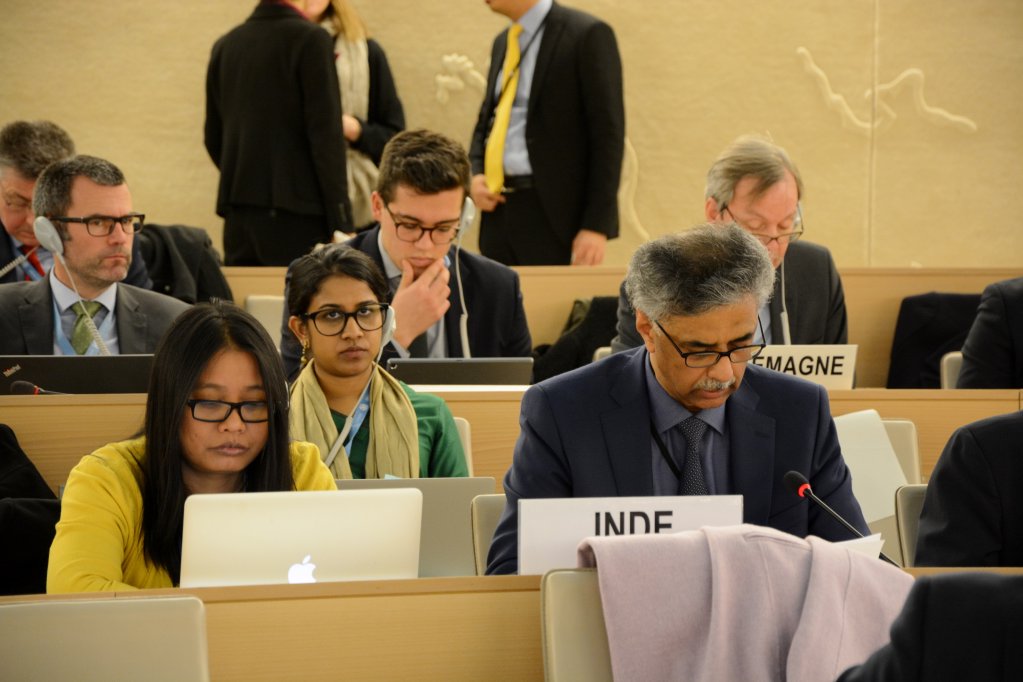
India had always supported efforts to preserve Sri Lanka’s character as a multi-ethnic society, including the Tamil community. India acknowledged that 75 per cent of the land held in 2009 by the security forces had been returned to the original and rightful owners. United Kingdom continued to urge the Government to take steps required to fully deliver on its commitments in resolutions 30/1 and 34/1 and to establish the full range of transitional justice mechanisms. What were the priorities for the United Nations assistance to Sri Lanka? Belgium commended the Government for its ongoing constructive engagement with the Office of the High Commissioner but regretted the further delay of the implementation of the Council’s recommendations. What impact would a possible re-application of the death penalty have on the transitional justice process in Sri Lanka?
North Macedonia welcomed the report, and recognized progress on advancing reconciliation in the country. However, in order for this progress to be sustained, they encouraged Sri Lanka to prepare a comprehensive strategy on transitional justice with a clear time frame. Germany encouraged Sri Lanka in its pursuit of transitional justice, by further establishing a Truth and Reconciliation Commission, and implementing long promised constitutional and justice reforms. Switzerland was alarmed at the considerable lack of progress in investigating abuses of human rights and violations of international law in Sri Lanka. Switzerland welcomed the decision of Sri Lanka to co-sponsor resolution 34/1 and urged them to implement it fully.
Iceland noted with concern the lack of progress in prosecuting human rights abuses perpetrated during the civil war, and called on Sri Lanka to establish a transitional justice agenda. They asked the High Commissioner how the specific needs of women and children could be taken into account in developing a reparations plan. Norway recognized the role played by democratic institutions in the peaceful resolution of the political situation from October to December 2018. However, progress on transitional justice had slowed, and Norway urged Sri Lanka to continue to address serious human rights violations that occurred during the conflict. Ireland welcomed Sri Lanka’s commitment to promote reconciliation, accountability and human rights under the terms of resolution 30/1. However, Ireland was concerned about proposals for a counter terrorism law that included the possibility of the death penalty as a punishment, and called on Sri Lanka to uphold the moratorium on such punishments.
China commended Sri Lanka for the results achieved in the domains of human rights, the elimination of poverty, and the rights of children, women and vulnerable groups. China had provided technical assistance and capacity building and hoped that the Government would maintain political stability and unity of the country. Montenegro said it was important that the forthcoming elections did not slow down the implementation of the Government’s obligations. Sri Lanka needed to advance reconciliation by addressing the issue of accountability based on truth, justice and ensuring reparations for victims in an effective way and with concrete results. Canada called on Sri Lanka to end impunity by enacting legislation that criminalized violations of international law without statutes of limitation and to establish a special court to prosecute violations of international law with the involvement of international investigators, prosecutors and judges. It asked what support the Council and Member States could provide to ensure progress towards accountability in Sri Lanka.
Croatia called upon the Sri Lankan Government to allow the independent operation of the Secretariat for Coordinating Reconciliation Mechanisms, and the Human Rights Commission so as to end impunity for crimes committed. Austria said that the Government’s inconsistent commitment to transitional justice had caused considerable delay and newly created human rights institutions had not been sufficiently supported by political leadership nor linked to accountability and truth seeking. It called on the Government to prepare a comprehensive strategy on transitional justice to honour its commitments. Liechtenstein recognized some important advances since 2015 but was concerned about the slow progress in establishing meaningful transitional justice mechanisms which had engendered further mistrust among victims and other stakeholders. It asked how the international community could support the Government in its efforts to engage in its transitional process and whether an expansion of the presence of the Office of the High Commissioner for Human Rights in the country would be an option.
Australia welcomed Sri Lanka’s co-sponsorship of resolution 40/1 as a positive demonstration of its commitment and encouraged it to deliver its transitional justice agenda in a timely and effective way. It recognized that more needed to be done to promote truth-seeking, accountability, justice and reconciliation.

Human Rights Commission of Sri Lanka, in a video statement, noted that strengthening independent commissions was a critical priority to consolidate democratic gains based on the past three years. The Commission had entered into a Memorandum of Understanding with the Office of Missing Persons to streamline collaboration between the institutions International Movement against all Forms of Discrimination and Racism (IMADR) noted that Sri Lanka had failed to address human rights violations and institutionalized violence. The Council had to renew the mandate of the Office of the High Commissioner to monitor and report on the implementation of resolution 30/1 at least every six months. Association Bharathi Centre Culturel Franco-Tamoul said that Sri Lanka’s topmost leaders had consistently rejected criminal accountability. The only possibility of Tamil victims seeing criminal justice was if Sri Lanka was referred to the International Criminal Court, or if an ad hoc criminal tribunal was set up. World Evangelical Alliance, in a joint statement with Christian Solidarity Worldwide, shared deep concern at the aggravation of intercommunal tensions and discrimination against Christian, Muslim and Hindu minorities. There was a Circular in place requesting all future constructions of any place of worship to be subject to prior permission of the Ministry of Religious Affairs and Moral Upliftment and it should be withdrawn.
Amnesty International was concerned that the Government had made slow progress in ensuring justice, truth, reparation and non-recurrence. The Council was urged to maintain scrutiny of Sri Lanka’s efforts and continue the High Commissioner’s reporting on Sri Lanka’s commitments in resolution 30/1. Human Rights Watch noted that thus far only the Office of Missing Persons had been set up and there had been no discernible progress on establishing an accountability mechanism involving international judges, prosecutors and investigators. Instead, Sri Lankan leaders repeatedly said there would be no foreign judges and “war heroes” would be protected from prosecution.
Asian Forum for Human Rights and Development noted that without a credible judicial mechanism to get accountability for crimes committed, any plans for judicial reform would ring hollow. The Council must have a field presence, and a Special Rapporteur for Sri Lanka to gather evidence and ensure that justice was served. Lawyers’ Rights Watch Canada noted that 4 years after the adoption of resolution 30/1, there been very little progress in investigating crimes committed during the conflict. Without significant international involvement, there could be no credible recourse to justice, given the politicization of the domestic judicial system. International Commission of Jurists was particularly concerned about the lack of progress in the area of criminal accountability, and called for the urgent creation of an international legal mechanism with international judges. They noted that women were grossly underrepresented in the justice system, which prevented women victims from having confidence in the effectiveness of that system.
Concluding Remarks on Sri Lanka
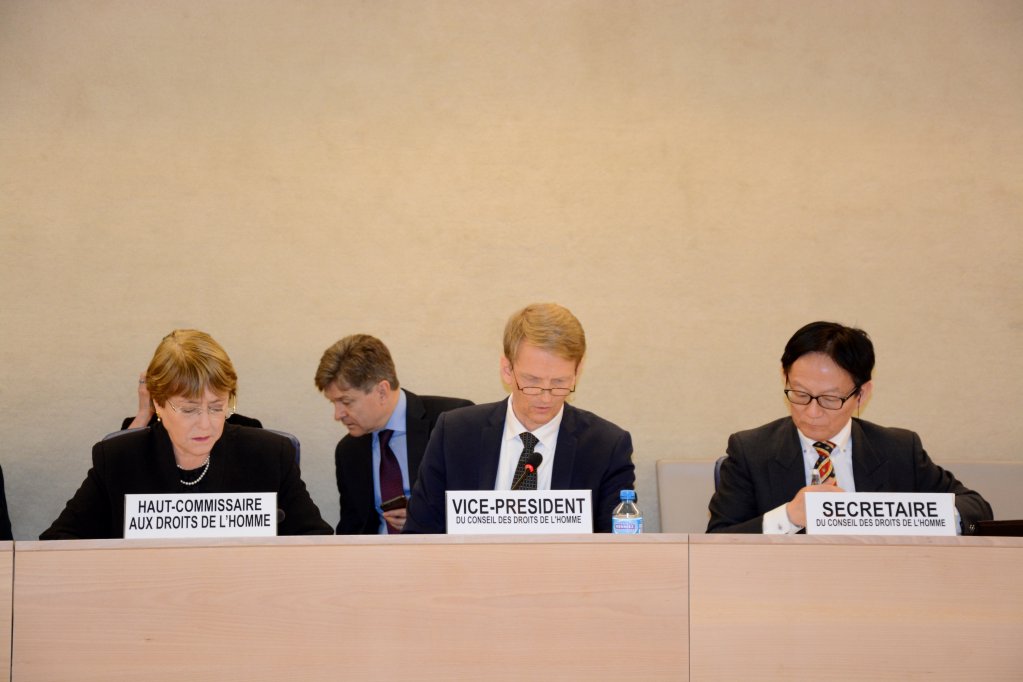
MICHELLE BACHELET, United Nations High Commissioner for Human Rights, in her concluding remarks, outlined some ways for the international community to support Sri Lanka in adhering to the resolution and meeting its human rights obligations. Slow progress had been made, particularly in terms of accountability, and the Government needed support in following the road map outlined by the resolution. The Office of Missing Persons and transitional justice mechanisms would need support to establish accountability. She encouraged the Government to establish a strategy on transitional justice that was time bound, so as to build trust between the various stakeholders. There was a lack of victim and witness safeguards, but the Office of the High Commissioner for Human Rights would continue to support the existing institutions to support these in collaboration with civil society and non-governmental organizations. The Council needed to maintain close attention to the situation in Sri Lanka and provide technical assistance to ensure progress to accountability. She had requested that the Government allow the Office of the High Commissioner for Human Rights to establish a permanent office in Sri Lanka. Should the delays continue and in the absence of progress, Member States should consider using international mechanisms to bring about justice, such as the International Criminal Court or sanctions.

